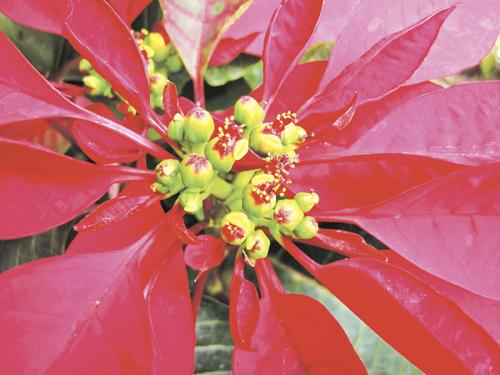Phuket Gardening: Say it with flowers

PHUKET: “SAY it with flowers” is a popular mantra of the florist business.
And for most occasions and certainly for most ladies, a romantic bouquet of roses or
lilies speaks louder than words.
For Christmas though, and for the keen gardener, something a bit more practical is the order of the day.
Indoor potted plants are always a sensible choice. They can grace the festive table and afterwards be transferred outdoors. The number one choice world-wide is what Thais refer to as kistmas, a euphorbia called poinsettia, which has huge red (sometimes yellow, green or cream-colored) leaves, which are in fact bracts.
Euphorbia pulcherrima, are now appearing everywhere in plant nurseries and can be kept indoors, provided it is not in a draught – air-conditioning will cause both bracts and leaves to drop. Put outside, it will require some protection from the full tropical sun, but in the right conditions can become a small tree.
Like the holly and mistletoe of Christian myth, the poinsettia is associated with religion. Legend has it that a poor Mexican girl, unable to provide a Christmas gift for her local church, gathered weeds and placed them outside the building. Miraculously, they blossomed and became poinsettias. Of course the vivid hue is also associated with the blood of Christ.
Another American native is the Jerusalem cherry. As a child, I remember we always had one at Christmas. A member of the solanum family (think potatoes and tomatoes), it is an excellent choice as a seasonal present and has masses of large, glossy, round berries in shades of green, yellow and orange. As a small plant with deep green leaves, maybe eighteen inches high, it makes an attractive table decoration.
Don’t over water, since this will result in leaf and berry loss, but do mist occasionally with a spray.
Whether the Jerusalem cherry will translate afterwards to your garden is open to question, but I would suggest filtered sunlight or semi-shade.
Need a Christmas tree? My third, more ambitious gift suggestion, is the Norfolk Island pine. As befits a conifer from the South Pacific, it grows well in Phuket. With its conical shape and layers of horizontal and profusely needled branches, it looks like an exotic Christmas tree and will tolerate life in a container. You will find young potted specimens in local nurseries. I bought a small one years ago; it now stands about three meters tall.
Re-potted once, it would still do service as a Christmas tree if I had the strength to carry it indoors.
I am not a fan, but you might want to consider artificial flowers as a seasonal gift. Their quality has certainly improved beyond measure in recent years. The Index store, for example, has a huge range, from neat pots of tulips, proteus, zinnias and the like, to large single- stemmed versions of delphiniums, lilies and sunflowers. If you prefer the real thing but want longevity, try dried arrangements of lotus seed-heads, teasles or straw flowers.
Tip of the week – Fruit types
The term fruit refers to the product of a plant’s reproductive system. Most, but by no means all, are produced by trees.
Shrubs that bear edible fruit include the caramba or country gooseberry, the roselle (hibiscus sabdariffa) whose small red fruits are made into a refreshing drink popular with Thais, and the pomegranate (punica granatum) which is full of flesh-covered seeds, and usually ends up as vitamin-rich juice.
Fruits range in style from a fleshy berry (mulberry), a drupe with a hard interior pit or stone such as a mangosteen, lansium or langsart, rambudan, to a pome (think apples, guavas).
There are also nuts with a hard outer shell such as coconuts, and legumes which produce pods (tamarind, sator, senna). Oddly, the peanut is a legume. Not all are edible and a few are toxic: for example the drupe of thevetiana (yellow oleander).
If you have a question or a garden that you would like featured, you can email the author here.
Keep checking our online Phuket Lifestyle pages or join our Facebook fan page for regular gardening features and tips.
— Patrick Campbell
Latest Thailand News
Follow The Thaiger on Google News:


























